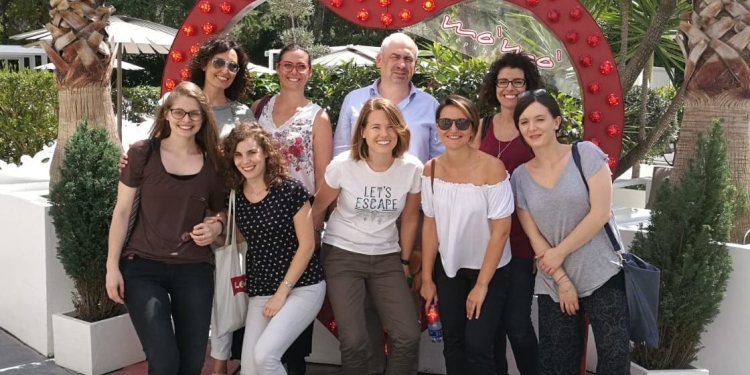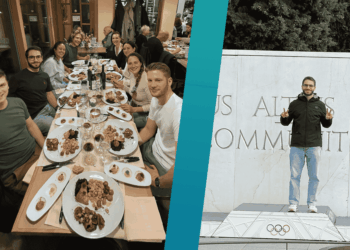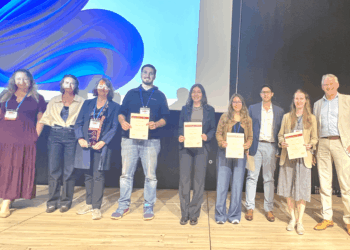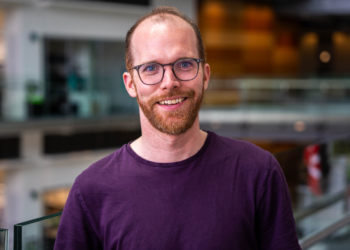EACR Travel Fellowships are co-sponsored by Worldwide Cancer Research and provide funds up to €3,000 to early-career cancer researchers. For more information on how to apply for Travel Fellowships, you can visit the EACR website.
Home institution and country: Complutense University, Madrid, Spain
Host institution and country: Istituto Nazionale per le Malattie Infettive Lazzaro Spallanzani, Rome, Italy
Dates of visit: 16 June 2018 – 16 August 2018
It has been demonstrated that Δ9-tetrahydrocannabinol (THC), the main active component of Cannabis sativa, has anticancer activities in different tumour types, including gliomas. This anti-tumour activity relies, at least in part, on the ability of THC to promote cancer cell death by triggering autophagy through the stimulation of de novo synthesis of sphingolipids. However, little is known about the mechanism whereby THC triggers this metabolic pathway. We are studying whether the THC could activate this pathway by inducing the degradation of ORMDL3, a protein that has been proposed to act as a negative regulator of de novo sphingolipid biosynthesis.

Why did you choose the host lab?
Dr. Guillermo Velasco, the PI of my home lab, had previously collaborated with Dr. Fimia in the analysis of the role of Ambra1 in cancer. He knows the expertise of Dr. Fimia’s group on proteomics and immunoprecipitation assays as well as on E3 ligases activity and ubiquitylation assays, which could be very helpful for our project.
We asked them about the possibility of performing some of the experiments with their help and they kindly offered a visit to their lab in Rome. They told us that they had already set up an in vitro ubiquitylation assay that could determine the lysine residues that become ubiquitylated in our protein, given that we already had the mutants for the candidate residues, and to test whether an E3-ligase could be responsible for this post-translational modification. Moreover, they offered the possibility of performing a mass spectrometry analysis of our samples to obtain the interactome of ORMDL3 upon normal conditions and after THC treatment, which could be very interesting for the future.
I learned new techniques, different ways of working and I have new ideas and a hypothesis for our project, which I will implement back in my home lab.
Can you summarise the research you did or what you learned on your visit?
First, we stably transfected U87MG cells with a plasmid encoding ORMDL3 tagged with a Flag tag in the N-terminal (Flag-ORMDL3). We cloned ORMDL3 into a retroviral expression plasmid and we packaged a virus in HEK293T cells. We subjected the U87MG cells to infection with the retroviruses, but as the efficiency was low, we didn’t use them for further experiments.
We performed endogenous immunoprecipitation of ORMDL3 in U87MG to analyse whether Cbl-b or TRIM21 binds to ORMDL3 upon THC treatment. We observed that TRIM21, but not Cbl-b, binds to ORMDL3 after THC stimuli. Moreover, we carried out the in vitro ubiquitylation assay, which consist in expressing the candidates E3-ligases, Cbl-b and TRIM21, and ORMDL3 in HEK293T, purified them by immunoprecipitation and performed the ubiquitylation reaction. We demonstrated that TRIM21 can ubiquitylate ORDML3 and that the lysine 152 is the one that becomes ubiquitylated.
Finally, we prepared the samples for the mass spectrometry assay, which will be performed in Rome in September. We treated U87MG cells with vehicle or THC and purified ORMDL3 by immunoprecipitation. We analysed the immunoprecipitated levels of ORDML3 in the different samples and froze them until they are processed for the proteomic assay.
Did you take part in any interesting local cultural activities?

The group organised a lunch before some people went on vacations. A couple of nights I joined some of my lab mates for the “apericena”, a typical Italian early dinner, kind of “afterwork”, where you order a drink and you can take food from a buffet.
Moreover, Rome has many cultural and musical events during the summer. I went to concerts, one of them in the amazing Terme di Caracalla, as well as going to the outdoor cinema. I visited some of the museums, including Galleria Borghese or Musei Capitolini, and I walked through the city, visiting the churches and cathedrals as well as visiting the Colosseo and Foro Romano, among other monuments. I also visited Vaticano and St. Peter’s Basilica.
Did you have a personal mentor or anyone who particularly helped you?

I mainly worked with the postdoctoral researcher Manuela Antonioli, who was my mentor during these two months. She has a wide expertise in proteomics and immunoprecipitation assays, because she analysed the interactome of a protein involved in autophagy, Ambra1 during her PhD. In addition, she carried out a postdoctoral period in Germany to learn about proteomics and mass spectrometry. Moreover, she has deep knowledge about autophagy, proteasome-mediated degradation and E3-ligases targeting.
She helped me with the experiments and discussed some possible hypotheses for my project. She also guided me to the next steps of my research career, informing me on the possible postdoctoral grants and research groups that could be interesting to collaborate with. She was very helpful, kind and I am very thankful to her.
Have you brought back any specific knowledge that has benefited your home lab?
The in vitro ubiquitylation assay will be very useful in my home lab because there are more people in our lab trying to identify target E3-ligases. The infection protocol with retroviruses for obtaining stable cell lines could be very helpful in the future, if we need to over express some protein in cell lines. I have also learned a different way of performing immunoprecipitation assays and other techniques, which is valuable knowledge that I can transfer into my home lab and future career.
Moreover, the results that I have collected are very useful for our project and it will be interesting if they can obtain ORMDL3’s interactome after analysing the sample that I left prepared for this purpose.
Does your lab plan to do any future collaboration with the host lab? Tell us about it.
Yes, a predoctoral student that works with Dr. Manuela Antonioli is coming to perform some in vivo experiments that they need for a publication they are preparing, at the end of the year. This is because they do not have an animal facility in the INMI Lazzaro Spallanzani and to take advantage from the greater expertise of our group, who work with animal models.
They will probably collaborate in the preparation of the manuscript for this work, checking figures and some results. I think this collaboration could last in the future because it is very advantageous for both groups.
How has this visit been beneficial to your research and your career?
I learned new techniques, different ways of working and I have new ideas and a hypothesis for our project, which I will implement back in my home lab.
I have also gained a collaborator and mentor, Dr. Manuela Antonioli, and I hope that our groups could work together in the future. Moreover, I obtained results that I could not get in my home lab and this is going to help us to publish this work.
Finally, I have had the opportunity of knowing and living Rome – a really beautiful city – and I met very nice people there. It has been a valuable experience.









